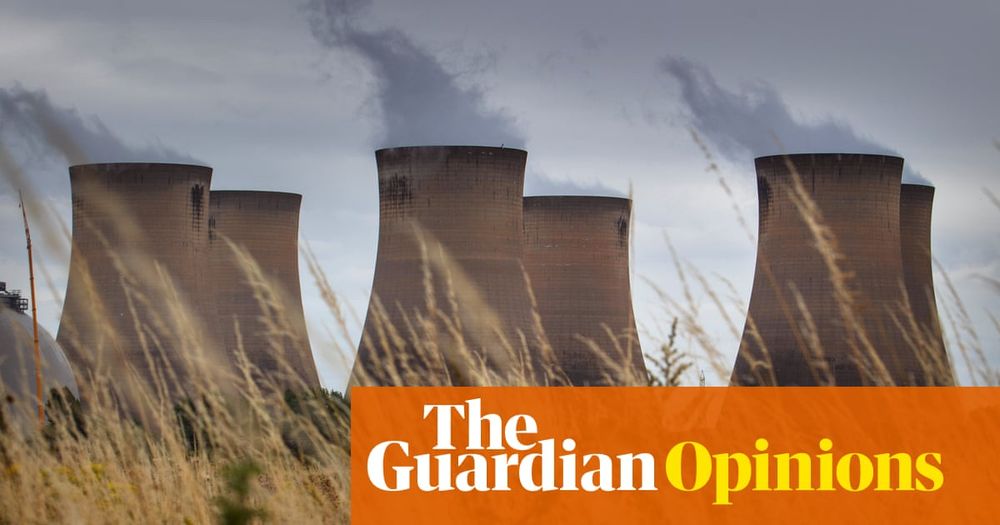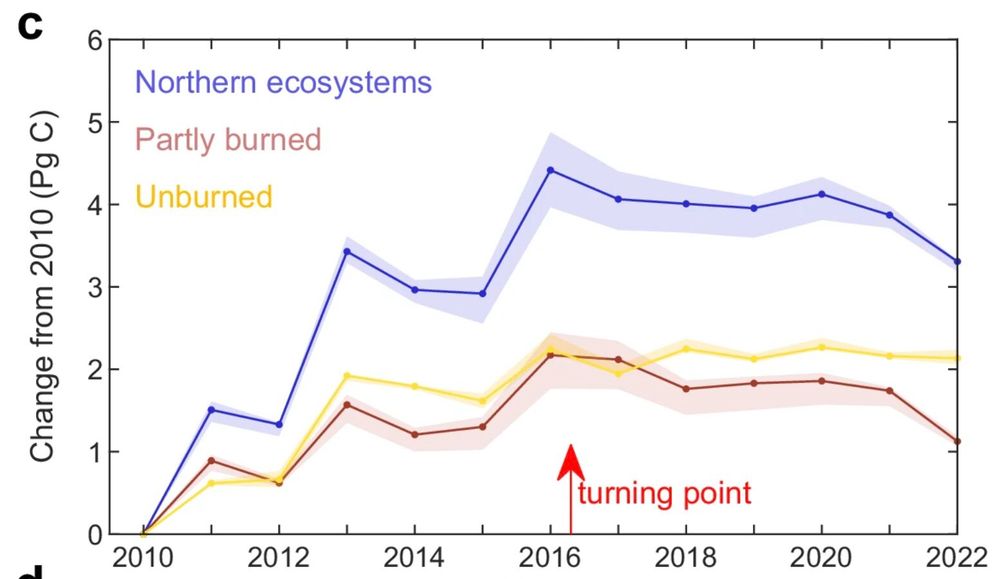
H2, although not a GHG, has an indirect Global Warming Potential 37 times more potent than CO2.
Carbon Brief:
www.carbonbrief.org/hydrogen-emi...
Research paper:
www.nature.com/articles/s41...
H2, although not a GHG, has an indirect Global Warming Potential 37 times more potent than CO2.
Carbon Brief:
www.carbonbrief.org/hydrogen-emi...
Research paper:
www.nature.com/articles/s41...

H2, although not a GHG, has an indirect Global Warming Potential 37 times more potent than CO2.
Carbon Brief:
www.carbonbrief.org/hydrogen-emi...
Research paper:
www.nature.com/articles/s41...
For Biospheric Modelers
There is a new activity led by @benpoulter.bsky.social at SPARK, supported by the GCP, called Warming Induced Emissions-Model Intercomparison (WIE-MIP).
There is a call for involvement and a funding opportunity with a deadline at the end of November.

For Biospheric Modelers
There is a new activity led by @benpoulter.bsky.social at SPARK, supported by the GCP, called Warming Induced Emissions-Model Intercomparison (WIE-MIP).
There is a call for involvement and a funding opportunity with a deadline at the end of November.

For Biospheric Modelers
There is a new activity led by @benpoulter.bsky.social at SPARK, supported by the GCP, called Warming Induced Emissions-Model Intercomparison (WIE-MIP).
There is a call for involvement and a funding opportunity with a deadline at the end of November.

www.carbonbrief.org/analysis-fos...
This year we had a rather big adjustment in land-use change emissions, including the change in carbon density due to CO2 fertilisation, etc.
rdcu.be/ePDDS

www.carbonbrief.org/analysis-fos...
This year we had a rather big adjustment in land-use change emissions, including the change in carbon density due to CO2 fertilisation, etc.
rdcu.be/ePDDS
While fossil CO2 emissions rise again and carbon sinks are weakened by climate change, deforestation emissions are down and many countries decarbonise their energy.
No global emissions peak yet though.
theconversation.com/the-worlds-c...

While fossil CO2 emissions rise again and carbon sinks are weakened by climate change, deforestation emissions are down and many countries decarbonise their energy.
No global emissions peak yet though.
theconversation.com/the-worlds-c...
Still no peak. Emissions are projected to increase by 1.1% in 2025, reaching 38.1 GtCO2. An all time high.

Still no peak. Emissions are projected to increase by 1.1% in 2025, reaching 38.1 GtCO2. An all time high.
essd.copernicus.org/preprints/es...

essd.copernicus.org/preprints/es...
We just published the Global Carbon Budget 2025, with a mix of bad news (CO2 emissions continue to grow) and encouraging news (35 countries saw emissions decline over the past decade while growing their economies).
Read the highlights in a short article:
theconversation.com/the-worlds-c...

We just published the Global Carbon Budget 2025, with a mix of bad news (CO2 emissions continue to grow) and encouraging news (35 countries saw emissions decline over the past decade while growing their economies).
Read the highlights in a short article:
theconversation.com/the-worlds-c...
Fossil CO2 emissions continue to rise in 2025 while the terrestrial carbon sink recovers to pre-El Niño strength.
The key findings are covered in two reports this year:
* ESSDD (preprint): essd.copernicus.org/preprints/es...
* Nature: www.nature.com/articles/s41...
1/

Fossil CO2 emissions continue to rise in 2025 while the terrestrial carbon sink recovers to pre-El Niño strength.
The key findings are covered in two reports this year:
* ESSDD (preprint): essd.copernicus.org/preprints/es...
* Nature: www.nature.com/articles/s41...
1/
While the land sink is up from 2024, carbon sinks are weakening: www.carbonbrief.org/...

While the land sink is up from 2024, carbon sinks are weakening: www.carbonbrief.org/...
To support this year's Global Carbon Budget, 2025, we are publishing
The big paper, made possible by the strong commitment of a core group of scientists, with @pfriedling.bsky.social at the lead, working with a network of equally committed contributors from 102 research organizations worldwide

To support this year's Global Carbon Budget, 2025, we are publishing
The big paper, made possible by the strong commitment of a core group of scientists, with @pfriedling.bsky.social at the lead, working with a network of equally committed contributors from 102 research organizations worldwide
We just published the Global Carbon Budget 2025, with a mix of bad news (CO2 emissions continue to grow) and encouraging news (35 countries saw emissions decline over the past decade while growing their economies).
Read the highlights in a short article:
theconversation.com/the-worlds-c...

We just published the Global Carbon Budget 2025, with a mix of bad news (CO2 emissions continue to grow) and encouraging news (35 countries saw emissions decline over the past decade while growing their economies).
Read the highlights in a short article:
theconversation.com/the-worlds-c...
Well, sorry to tell you, 1.5°C have always been overshoot scenarios. Here from the original 'SSP' 1.5°C scenarios published in 2018.
[Overshoot is a scenario design]

Well, sorry to tell you, 1.5°C have always been overshoot scenarios. Here from the original 'SSP' 1.5°C scenarios published in 2018.
[Overshoot is a scenario design]
agupubs.onlinelibrary.wiley.com/doi/10.1029/...

agupubs.onlinelibrary.wiley.com/doi/10.1029/...
I feel privileged to have had the opportunity to make a small contribution to this paper, just published.
"Building relationships between First Nations Peoples and Western scientists to increase capacity to understand, respond and adapt to climate change"

I feel privileged to have had the opportunity to make a small contribution to this paper, just published.
"Building relationships between First Nations Peoples and Western scientists to increase capacity to understand, respond and adapt to climate change"
theconversation.com/the-climate-...

theconversation.com/the-climate-...
A new study, led by Matthias Cuntz and our dearest late Vanessa Haverd, shows beautifully how the increase of the seasonal variation in atmospheric CO2 in the Northern Hemisphere over the past 40 years can only be explained by an increase in the CO2 uptake by plants.
doi.org/10.1029/2025...

A new study, led by Matthias Cuntz and our dearest late Vanessa Haverd, shows beautifully how the increase of the seasonal variation in atmospheric CO2 in the Northern Hemisphere over the past 40 years can only be explained by an increase in the CO2 uptake by plants.
doi.org/10.1029/2025...
theconversation.com/around-250-m...

theconversation.com/around-250-m...
Yet ludicrously, UK Gov pretends its emissions are zero.
Reports on its impact on primary forests have been covered up.
Ministers are being played. Again.
Great article by @dalevince.com

Yet ludicrously, UK Gov pretends its emissions are zero.
Reports on its impact on primary forests have been covered up.
Ministers are being played. Again.
Great article by @dalevince.com

There is so much discussion about TIPPING POINTS, yet there are so few current large-scale examples that have been demonstrated quantitatively.
Xiaojun Li et al show a remarkable shift from accumulating carbon in living biomass in the northern temperate regions to losing carbon since 2016.

There is so much discussion about TIPPING POINTS, yet there are so few current large-scale examples that have been demonstrated quantitatively.
Xiaojun Li et al show a remarkable shift from accumulating carbon in living biomass in the northern temperate regions to losing carbon since 2016.
There is limited information available, and the article below draws some information from the Plastics & Climate Project. Light reading.
www.washingtonpost.com/climate-envi...

There is limited information available, and the article below draws some information from the Plastics & Climate Project. Light reading.
www.washingtonpost.com/climate-envi...


